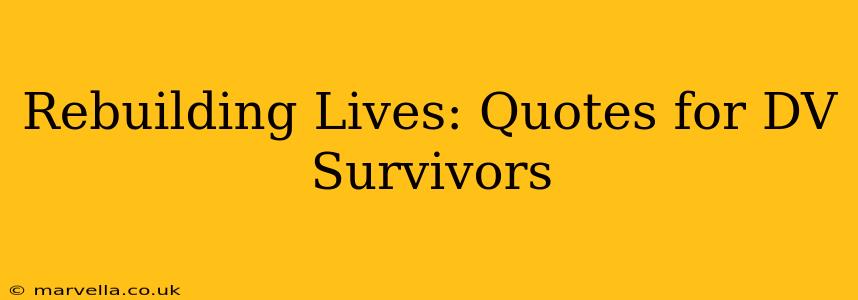Domestic violence leaves deep scars, impacting every aspect of a survivor's life. The journey to healing and rebuilding is long and challenging, but it's undeniably possible. Finding strength and inspiration can be crucial during this process, and sometimes, a powerful quote can offer just the right nudge forward. This post compiles uplifting and empowering quotes specifically chosen to resonate with domestic violence survivors, offering hope and encouragement on their path to recovery. We'll also explore some frequently asked questions surrounding the healing process.
What are some encouraging quotes for domestic violence survivors?
Many quotes offer solace and strength. Here are a few particularly resonant ones:
-
"The oak fought the wind and was broken, the willow bent when it must and survived." – Robert Jordan: This metaphor perfectly encapsulates the resilience needed to survive and thrive after domestic violence. Rigid resistance can be damaging, while flexibility and adaptation are key to healing.
-
"What lies behind you and what lies in front of you, pales in comparison to what lies inside of you." – Ralph Waldo Emerson: This quote reminds survivors of their inner strength, a power often underestimated during abuse. Healing starts with recognizing and tapping into this inner resilience.
-
"You are braver than you believe, stronger than you seem, and smarter than you think." – A.A. Milne: This simple yet profound quote speaks directly to the self-doubt and diminished self-worth often experienced after domestic violence. It's a gentle reminder of inherent capabilities.
What is the first step in recovering from domestic violence?
The first step is often the hardest: seeking help. This can involve reaching out to a domestic violence hotline, a trusted friend or family member, a therapist, or a local shelter. Acknowledging the abuse and seeking support is a courageous act that sets the stage for healing. Remember, you are not alone.
How long does it take to recover from domestic violence?
There's no set timeline for recovery. It's a deeply personal journey, varying greatly depending on individual circumstances, the severity of the abuse, and access to support. Some survivors find healing within months, while others require years. Patience, self-compassion, and ongoing support are crucial.
What are some common challenges faced by domestic violence survivors?
Survivors often face a multitude of challenges, including:
- PTSD (Post-Traumatic Stress Disorder): Flashbacks, nightmares, and hypervigilance are common.
- Depression and Anxiety: These mental health conditions are frequently linked to trauma.
- Physical Injuries: Physical abuse can leave lasting physical and emotional scars.
- Financial Instability: Abuse can disrupt employment and financial security.
- Isolation and Loneliness: Abuse often isolates survivors from their support networks.
- Legal Issues: Obtaining protective orders and navigating the legal system can be complex and stressful.
Where can I find support for domestic violence?
Numerous resources exist to help domestic violence survivors. These include:
- The National Domestic Violence Hotline: Provides confidential support, crisis intervention, and referrals to local resources.
- Local Domestic Violence Shelters: Offer safe housing, counseling, and other essential services.
- Therapists specializing in trauma: Can provide individual or group therapy to help process trauma and develop coping mechanisms.
- Support groups: Connecting with other survivors can provide a sense of community and shared understanding.
How can I help a friend or family member who is experiencing domestic violence?
Offer unwavering support, listen without judgment, and believe their experiences. Encourage them to seek help and offer practical assistance, such as helping with childcare or transportation. Remember, you can't force someone to leave an abusive situation, but you can be a vital source of strength and support.
Rebuilding a life after domestic violence requires immense courage and resilience. Remember these quotes, embrace the support available, and believe in your strength. You deserve to live a life free from violence and fear. Your journey to healing is valid, and you are not alone.

